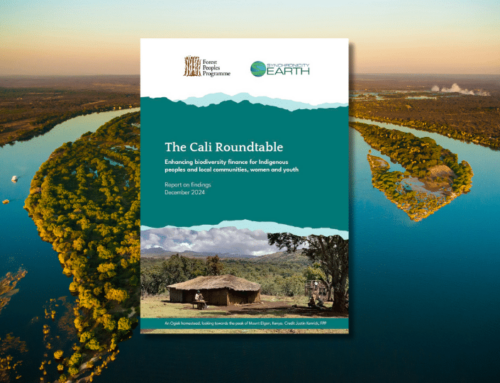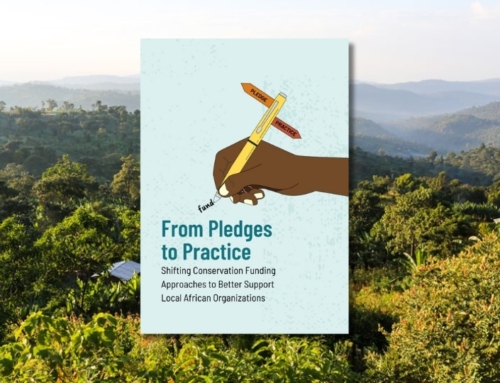Simon Ruddick is the founder and current Chairman of Albourne Partners, a major player in the financial services industry that has been providing research advice on alternative investments since 1994. The combined investments of the firm’s clients now top $500 billion.
As a long-standing supporter of Synchronicity Earth, we asked Simon what lay behind his growing passion for the natural world and his commitment to promoting the urgency of environmental issues within his industry. We also learnt more about what Albourne is doing to promote greater integration of Environmental, Social and Governance criteria in the sector.
 What is one of your earliest memories of nature?
What is one of your earliest memories of nature?
Well, let me start by telling you a shocking story. One of my earliest memories is when I was in a kindergarten class. The teacher told us that for the next class we were going to go outside to study something called ‘nature’: she was going to tell us about the names of trees and plants and other things. I remember thinking – and this was an absurdly precocious thought for someone under 5 years old – I’m not going to listen to this because I want to keep space in my head for other topics!
So what changed?
I think in our youth we latch on to a range of viewpoints on various topics, feel comfortable with those and our views become somewhat fixed over time and as we get older. But it’s shocking when something happens and you realise that you’ve just got it completely wrong. I’m ashamed to say that my interest in nature and the environment – in how essential and life-defining it is – is a relatively recent occurrence. I’ve been passionate about a lot of things in life, but I’ve come late to this one. Not because I didn’t care, but because I felt terribly under-equipped to understand the subject and didn’t feel that I brought any skills to the table. The scale of the problem seemed so overwhelming and beyond my power to change, which I think is quite a common feeling.
But now I’m deeply concerned – consumed almost – by thoughts about the environment and what is happening to the diversity of species in the world.
How did you come across Synchronicity Earth, and how would you describe your involvement with the charity?
Well, it was through a combination of business and pleasure. I got to know Adam Sweidan (Chairman of Synchronicity Earth), as we work in the same industry, and through him I got to know Jessica Sweidan (Founding Trustee of Synchronicity Earth) and spent time with them both socially. Personally, I tend to run on 95% emotion and 5% facts. I find that energy and enthusiasm are fabulously contagious, so meeting them and seeing the sincerity of their passion for the environment kick-started my own interest and enthusiasm. Since then, and because I’ve supported them and been to many of their events, several things have happened. First of all, Synchronicity Earth gives the best feedback to its donors of any charity we deal with. We have dealt with a lot of charities, and it’s kind of perverse how bad many of them are at giving feedback and reporting, regardless of how big or well-recognised they are. Synchronicity Earth are not only top in terms of the feedback they provide, they are by far and away the best we have dealt with to date, and a shining light of what can be done. For me, they are very good at turning donors into believers.
I remember going to one amazing Synchronicity Earth event, where they talked about the extraordinary diversity of species on Earth and made the point that there are ‘poster’ species that get a relatively large amount of funding, but that it is the less charismatic, ‘ugly’ species that struggle, despite them being just as important. In fact – and I was teased by colleagues about this – we ended up supporting a conservation project for a blue, legless worm-type creature!
I’ve recently been reading a book about effective altruism and ‘doing good better’ and it’s exactly this! It says that if you want to make a change, go to the unfashionable areas, and the things most people aren’t thinking about.
In terms of our involvement, we started out by providing funding for a mangrove restoration programme in Southern Thailand. We were thrilled to work with Synchronicity Earth and their partner on that. It came about because we were holding an event in Singapore and were very conscious of our carbon footprint. Synchronicity Earth suggested supporting this work through their Regeneration approach, and it was just a perfect fit.

Albourne Partners supported Mangrove Action Project (MAP) in their work with local communities in Southern Thailand to regenerate vital mangrove ecosystems. Photo: Albourne Partners/MAP
Right now, why do you think it’s important to ‘invest in’ conserving and restoring nature?
I think that for too long we’ve measured growth and development – of the individual, of society – in purely economic terms, but there is something that is much harder to measure, yet more important: happiness.
For me, the key to happiness is something far deeper and more profound than pleasure: it’s about purpose. Purpose gives dignity to what we do, and a sense of fulfilment. This is surely something that everybody craves.
The human race seems to have a genius for analytical thinking and we’ve achieved incredible things, but our lack of long-term focus and our obsession with the here and now is what has left us with the enormous challenges we face. This short-term thinking has left us with the twin challenges of climate change and unprecedented biodiversity loss, and I can’t think of a better focus or priority of purpose than trying to do something about that.

Forest fires in the world’s second largest rainforest in the Congo Basin. Photo © Chris Scarffe
How do you think the financial services industry, and Albourne in particular, can drive positive change for nature?
Part of my recent awakening is the realisation that, while I know I can’t do everything about it, I can certainly do something about it. For me it’s about finding the best point of entry to make a difference and clearly, for me, this is in the financial services industry.
At Albourne, we work for the world’s investors, helping them to evaluate investment opportunities in complicated – most people call it alternative – assets i.e. hedge funds, private equity, real estate, infrastructure, venture capital and so on. Our aim is to look after investors and protect their interests. In terms of Environmental, Social and Governance (ESG) issues, we’re fortunate to have a very strong position in the market that we’re in, and we want to harness that strength to have a positive impact in this ESG space. We have publicly committed to putting a huge amount of time, thought and work into ESG and to not charging for the information we provide to our clients on this. We have a document called ‘Core Conscience’ which we use to collect information from all the funds we look at. Any fund manager we interact with is invited to answer a set of questions relating to ESG, which have been distilled by endless conversations with a wide range of our clients who are passionate about the subject. We believe that you can affect change by keeping, collecting and collating a score of what people are doing in terms of ESG.
Looking at Environmental, Social and Governance issues from an investor’s perspective I see three types of people: There are those who are already deeply passionate about the subject, and that’s a minority, albeit a meaningful minority; then there’s another minority at the opposite extreme who, I don’t think, will ever focus on it – not necessarily because they’re entirely without concern but because that is how they interpret their mandate and make organisational decisions. But what is interesting is that the overwhelming majority sit between those two, and that ‘fat middle’ – as opposed to the ‘fat tail’ – are people who are concerned about the environment, and who have stakeholders who are hugely concerned. What holds them back is the fear that accentuating ESG as a priority may impact the choice or diversity of investments that they can look at. I see all kinds of firms out there who absolutely do get it and know they should be doing something, not just for their clients but also for their colleagues. But the caveat to that is a nagging fear that the ratio of talk to action is still unhealthy.
The point about the information we are gathering is that it enables that ‘fat middle’ to become more aware of ESG and start to include it in portfolios. When in time they start to lose their fear of the opportunity cost of making ESG a sort criteria, then many more will formally adopt it. I think there is no doubt that when and to what extent coherent and convincing ESG offerings exist, there will be extraordinary demand for them and that somewhere down the line they will become a must have, rather than a nice to have.
Some people may be sceptical that the financial service sector is genuinely committed or able to change, given the system within which it operates?
Something I’m consciously trying to encourage in Albourne is an alternative type of thinking around a form of capitalism that is based on long-term collaboration, rather than this obsessive and entirely foolhardy belief that the simple sum of short-term solutions will lead us to a good place. I’ve realised that the vulnerability of finance is analogous to the vulnerability of the environment: short-termism has completely taken humanity’s attention away from the longer term issues. In our industry, we spend all our time worrying about systemic risk and how we can stop it in financial markets and that’s important. But there is a systemic crisis happening in our environment and we need to think of it in those terms and work out how we can most effectively be part of the response to address that, and help persuade people to not just think about it , but to actually do something about it.
So, while I’m not a scientist, and I’m not qualified to talk about the environment, at this most basic level, that need for long-term collaboration, both in finance and the environment seems to be a striking, but blindingly obvious point.
We have no voice in the science community, but we have a loud voice in the world of global, financial capital markets, so let’s shout where we can.
You know, a lot of people hate hedge fund managers and investment bankers, without really knowing why. They are often not easy to love, but of course that is not true in all cases! Having said that, as a genre of thinking, harnessed correctly, hedge fund type thinking can be a source of huge and wholesome change. I aspire to and dream of a day when we can unleash the hedge fund mindset on philanthropy to increase the pace of change.
There have recently been some very high profile philanthropic pledges made to tackle climate change and biodiversity loss. Do you think this is evidence of the beginning of some kind of sea change?
I think it is a huge sign of change. It’s fantastic to see investment managers and these big foundations getting involved. But in some ways, it shouldn’t come as a surprise. The underlying story is, literally, life-defining: it defines whether we have life on Earth or not in a certain number of years, so there’s no underestimating its importance. I believe the key is to get people emotionally invested, not just financially invested. People need to be engaged today, to have this at the front of their mind, and this is about the feedback they get and the level of involvement they feel. They’ve got to know that what they’re doing has an effect, and become addicted to their ability to have an impact and to genuinely understand that impact. That is what will fan the wildfire of enthusiasm – an inappropriate analogy I know!
Bearing in mind that I’m a glass half full optimist, I do think we’ve already had the tipping point of awareness, but I sincerely hope that we’re not a million miles away from the tipping point of action. Having said that, while I believe that the financial sector is beginning to develop in the right direction, what would really accelerate change is meaningful action at the political level.
What is it that makes a good charity?
I think what charities can aspire to – and what the best charities do – is create an experience that is valuable and meaningful for the donor. As a donor, maybe I shouldn’t need anything beyond feeling good about the work that Synchronicity Earth does and supports, but I get as much – if not more – pleasure from my meetings with them, from listening to them, reading their material, enjoying the buzz, experiencing the passion and feeling their sincerity. That is worth the money alone, and why not? It can genuinely be a win-win: do something positive for the world, but also spend time with great people and enjoy it. It doesn’t have to be one or the other. I used to be totally uninterested in nature – I’d have been in the bottom one percent, my head was full of other things – but I think there’s a saying that there’s none so zealous as a recent convert. Now I’m fully paid up and ready to shout it from the rooftops, and it was Adam and Jessica’s passion and sincerity that was the catalyst for this change. So I guess that is what charities can aspire to!





